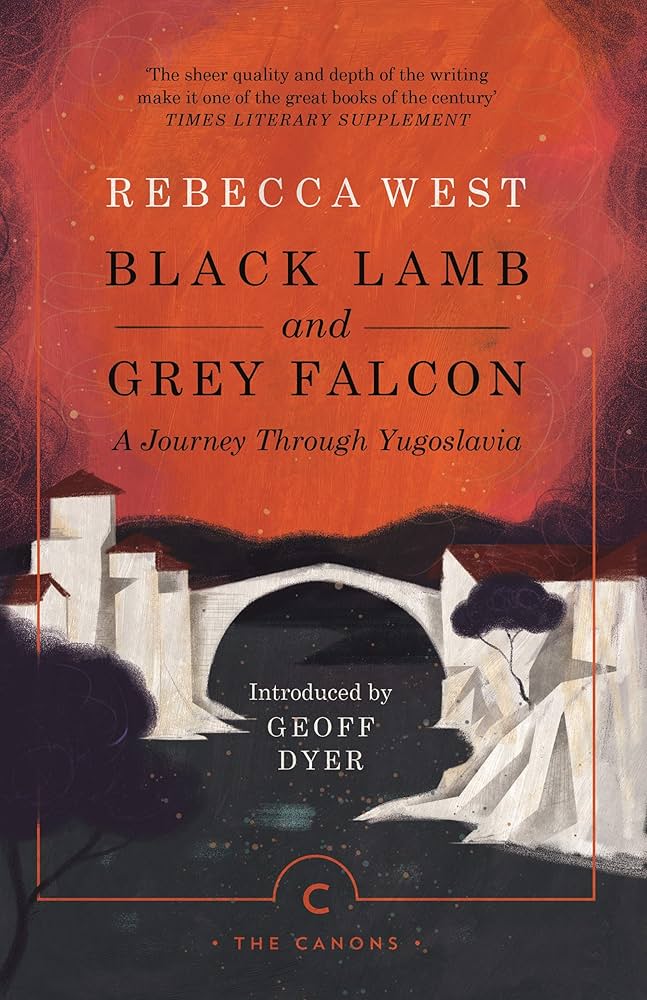In the vast landscape of 20th-century travel literature, few works capture the complex interplay of history, culture, and personal reflection as vividly as Rebecca West’s Black Lamb and Gray Falcon. This sprawling narrative does more than recount a journey through yugoslavia; it delves deep into the tangled roots of identity and the echoes of a turbulent past. As both a travelogue and a profound meditation on the forces that shape nations and individuals alike, West’s masterpiece invites readers to explore not just a region, but the very essence of how history defines who we are. This review seeks to unravel the layers of West’s intricate work,examining how her insightful prose bridges the personal and the political in a landscape forever marked by change.
Unraveling the Complex Tapestry of Balkan History Through Rebecca West’s Epic Narrative

Rebecca West masterfully weaves a vivid and intricate portrait of the Balkans, navigating a terrain where history, culture, and identity collide in dramatic fashion. Her narrative unfolds not simply as a travelogue but as a profound exploration of a land scarred by centuries of conflict and conquest,yet brimming with resilient spirit. West’s acute observations capture the paradoxes of the region-where ancient traditions coexist uneasily with the tides of modernity, and where every valley and mountain echoes with stories of triumph and tragedy.
Within her epic journey, contrasting elements of the Balkans emerge, underscoring its multifaceted character. The reader encounters:
Best-Selling Books in This Category
- Religious diversity that shapes interpersonal and political dynamics, from Orthodox Christianity to Islam and Catholicism.
- Ethnic complexity that challenges any simplistic notion of identity, revealing interwoven legacies of Slavs, Turks, Romanians, and others.
- Ancient layers marked by Ottoman dominion, Austro-Hungarian influences, and fervent nationalist movements.
| Theme | Significance in West’s Narrative |
|---|---|
| Cultural Intersection | Highlights shared histories and continuous cultural exchange |
| Political Fragmentation | Explores the tensions feeding regional instability |
| Identity and Belonging | Reveals the fluid nature of self amidst historical forces |
A Deep Dive into the Multifaceted Identity Themes Interwoven in Black Lamb and Grey Falcon

Rebecca west’s masterpiece intricately weaves a tapestry of identity that transcends simplistic notions of nationality and culture. Through her vivid explorations of the Balkan Peninsula, West confronts the fragmented histories and deeply rooted ethnic tensions that define the region. The narrative unfolds with a poignant recognition of identity as both fluid and fractured-a paradox where individuals and communities simultaneously cling to tradition and grapple with modernity’s forces. This dynamic is manifested in her portrayal of cultural collisions, where the ancient and the contemporary collide, giving rise to a layered portrayal of self that is neither fixed nor easily categorized.
The complexity of identity in the work can be understood through a framework involving key thematic strands, each contributing to the multifaceted nature of selfhood portrayed in the text:
- Historical Legacy: The burden and beauty of past empires echo in personal and collective memories, shaping attitudes and belongings.
- Religious Hybridity: The coexistence and conflict among Orthodox, Catholic, and Islamic traditions inform a layered spiritual identity.
- Political Allegiance: Loyalties shift amid rising nationalism,reflecting identity’s political vulnerability and resilience.
- Gender Roles: West’s nuanced observation of how identity intersects with societal expectations of men and women.
| Theme | Manifestation in the narrative | Impact on Identity |
|---|---|---|
| Historical Legacy | Stories of fallen empires and ancestral glory | Creates a sense of pride and burden simultaneously |
| Religious Hybridity | Conflicted spiritual practices and rituals | Generates a complex, multilayered cultural identity |
| Political Allegiance | Shifting loyalties amid nationalistic fervor | Highlights the fragility and adaptability of belonging |
| Gender Roles | Contrasting expectations for men and women | Reveals identity tensions shaped by societal norms |
How West’s Travelogue Blurs the Line Between History, Culture, and Personal Reflection

Rebecca West’s journey transcends the mere recitation of events or cultural facts. Her narrative intricately weaves together sweeping historical accounts with detailed observations of the Balkans’ multifaceted cultures, all filtered through her deeply personal lens. The result is a tapestry where the past is not a static background but a living, breathing presence that interacts with the present. Through her prose,readers do not simply learn about history-they feel its weight,its contradictions,and its ongoing dialog with identity.This blend challenges conventional travelogue formats, transforming the reader’s experience into an exploration of both external landscapes and internal contemplation.
Within her expansive work, several key elements highlight this unique fusion:
- Historical Context: Detailed recounting of centuries-old conflicts and traditions, grounding her observations in a rich temporal framework.
- Cultural Complexity: An empathetic portrayal of diverse ethnicities, customs, and languages, emphasizing the region’s layered identity.
- Personal Reflection: West’s candid emotional responses and philosophical musings,which invite readers to question their own perspectives on history and belonging.
| Aspect | West’s Approach | Effect on Reader |
|---|---|---|
| History | Interwoven storytelling with primary sources and oral histories | Engages curiosity and fosters a nuanced understanding |
| Culture | Immersive descriptions of traditions and local life | Builds empathy and appreciation for diversity |
| Personal | Introspective commentary and candid narrative voice | Creates intimacy and invites self-reflection |
The role of Conflict and empire in Shaping the Characters and Societies Explored in the Book

Conflict and empire serve as the turbulent undercurrents that propel the characters and societies in Black Lamb and Grey Falcon toward change and introspection. The book intricately weaves historical upheavals-ranging from centuries of Ottoman rule to the rise of nationalist movements-into the very fabric of personal and collective identity. Individuals are portrayed not merely as passive victims but as active participants entangled in the push and pull of empires, their loyalties and beliefs constantly tested by the shifting sands of power. This dynamic manifests in characters who embody contradictions: loyalty and rebellion, tradition and change, subjugation and empowerment. through their stories, West reveals how history’s grand narratives reverberate through intimate human experiences, shaping emotions, motivations, and social structures alike.
- Empires as double-edged forces: sources of both oppression and cultural exchange.
- Conflict as a crucible: forging new identities amid destruction and resilience.
- Characters as microcosms: reflecting the complexity of Balkan societies caught between East and West.
| Aspect | Influence of Empire | Resulting societal Change |
|---|---|---|
| Religion | Imposed and blended religious traditions | Diverse yet conflicted spiritual identities |
| Language | Multilingualism as a necessity | Cultural hybridity and barriers |
| Governance | Centralized imperial rule vs. local autonomy | Persistent tensions and movements for independence |
Exploring West’s Unique Narrative Voice That Balances Scholarly Insight and Poetic Description

Rebecca West’s distinctive narrative style in Black Lamb and Grey Falcon is a masterful blend of rigorous scholarship and lyrical storytelling. Her prose seamlessly interweaves historical facts with vivid, sensory descriptions, creating a tapestry that feels both intellectually stimulating and emotionally evocative. This duality allows readers to not only grasp the complexities of Balkan history but also to experience its landscapes and cultures in a profoundly intimate way. West’s voice often shifts with a poetic cadence, imbuing even the most intricate political analyses with an almost musical rhythm that appeals to the senses as much as the mind.
Her unique approach can be broken down into several key elements:
- Analytical Depth: Detailed explorations of events supported by extensive research, offering nuanced perspectives.
- Descriptive Richness: Lush imagery and personal reflections that bring place and people to life.
- Intertextual Nuance: references to literature, mythology, and folklore that enrich historical context.
- Engaged Subjectivity: A narrative voice that acknowledges its own emotional response, bridging observer and participant.
| Aspect | Scholarly Insight | Poetic Description |
|---|---|---|
| Tone | Objective, analytical | Lyrical, evocative |
| Purpose | Educate, explain | Engage, inspire |
| Language | Precise, formal | Rich, metaphorical |
| impact | Informs understanding | Stirs creativity |
The Significance of Place and Landscape in Conveying the Spirit of the Balkans
Rebecca West’s journey through the Balkans unfolds not just as a historical account, but as an intimate exploration of how geography shapes identity and culture. The rugged mountains, flowing rivers, and ancient towns become more than mere backdrops-they are active storytellers, echoing the complex tapestry of ethnicities, traditions, and histories that define the region. The landscape mirrors the contradictions and resilience of its people, revealing a spirit marked by both enduring hardship and vibrant vitality. West’s vivid descriptions invite readers to see the Balkans through a lens that honors the land as a silent witness to centuries of conflict and coexistence.
Key elements of the landscape that resonate throughout West’s narrative include:
- • The shadowed peaks of the Dinaric Alps, symbolizing isolation and endurance
- • The winding course of the Danube, a lifeline connecting diverse cultures
- • The ancient fortresses perched on rocky cliffs, emblematic of a turbulent past
| Landscape Feature | Symbolic Meaning | Associated Cultural Aspect |
|---|---|---|
| Mountains | Strength and Isolation | Preservation of traditions |
| Rivers | Connection and Flow | Trade and migration |
| Villages | Community and Memory | Oral history and folklore |
Through her intricate weaving of place and narrative, West captures an essence that transcends mere description. The Balkans emerge as a living, breathing entity-its spirit deeply entwined with the contours of its landscape, offering profound insights into how environment and identity are inseparably linked across time and tradition.
Why Black Lamb and Grey Falcon Remains Essential reading for Understanding Eastern European History
Rebecca West’s Black Lamb and Grey Falcon is more than just a travelogue; it is indeed a profound exploration of a region frequently enough misunderstood or overshadowed in Western historical narratives. Her meticulous observations and deep cultural insights provide readers with an immersive encounter of the Balkans, capturing the complexity and contradictions that define Eastern Europe. Through vivid storytelling interwoven with historical analysis,west brings to life the struggles,passions,and identities of the people living in a land shaped by centuries of conquest,faith,and fierce independence. This makes the work indispensable for those seeking to comprehend the roots of modern Eastern European tensions and transformations.
Several qualities elevate the book as an essential lens on this turbulent region:
- Interdisciplinary Approach – weaving history, anthropology, and personal travelogue into a rich tapestry.
- historical Depth - offering a panoramic view of the cultural and political shifts from Ottoman decline to the interwar period.
- Emphasis on Identity – highlighting the interplay between diverse ethnic groups, religious traditions, and nationalisms that continue to resonate today.
| aspect | Significance in the book |
|---|---|
| Cultural Diversity | Explored through vivid character portraits and detailed customs. |
| Political Turmoil | Examined via narratives of empire collapse and burgeoning nationalism. |
| Geographical Symbolism | Landscape as metaphor for historical wounds and resilience. |
Recommendations for Readers Interested in Historical Travel literature and Cultural Studies
For those captivated by Rebecca West’s intricate tapestry of history and identity, diving deeper into related works can enrich your understanding of both the Balkans and the broader dynamics of cultural interplay. Exploring travel literature that blends personal narrative with historical context is key to appreciating the nuanced perspectives West offers. Titles that interweave place, memory, and national character encourage readers to reflect on how geography shapes identity, much like West’s immersive approach in Black Lamb and Grey Falcon.
Consider expanding your reading list with these carefully selected titles, each resonating with themes of history, culture, and the travel writer’s gaze:
- Bruce Chatwin’s In Patagonia – a journey through remote landscapes and cultural myths
- Jan morris’s Venice – a richly textured exploration of place and identity
- Norman Lewis’s The Painted Veil – detailing colonial encounters with cultural intricacies
- Edward Said’s Culture and Imperialism – for a critical examination of power and representation
| Book | Author | Focus |
|---|---|---|
| In Patagonia | Bruce Chatwin | Myth and landscape |
| Venice | Jan Morris | Place and identity |
| The Painted Veil | Norman Lewis | Colonial cultural encounters |
| Culture and Imperialism | Edward Said | Power and representation |
Analyzing West’s Portrayal of Nationalism and Its Impact on Collective Memory and Identity
Rebecca West masterfully weaves a complex narrative that captures the essence of nationalism not merely as a political force but as a living, breathing thread in the fabric of identity. Her portrayal transcends simplistic patriotism,instead revealing how collective memory shapes-and is shaped by-the historical traumas,cultural myths,and rituals embedded in society. Through vivid descriptions and introspective commentary, West exposes nationalism’s dual-edged nature: it can unify disparate groups under a shared heritage but also fracture communities with competing historical narratives. This duality invites readers to reflect on how national identity is as much about what is remembered as it is about what is forgotten or suppressed.
West’s narrative style actively engages readers in the process of decoding history by presenting nationalism as a mosaic of:
- Mythic tales that bolster pride and resilience
- Historical wounds that haunt collective consciousness
- Cultural symbols that foster belonging and division
By doing so, she underscores how collective memory and identity are continuously constructed and reconstructed through storytelling. This dynamic interplay disrupts any static notion of nationhood and rather positions it as an evolving, contested space where personal and collective memories interact.The implications echo far beyond the Balkans,offering a poignant commentary on how nations remember themselves-and ultimately,how they choose to imagine their place in the world.
| Aspect | West’s Interpretation | Impact on Identity |
|---|---|---|
| Myth & Legend | Foundation for national pride | Creates a shared heroic past |
| Historical Trauma | Source of division and grief | Shapes collective fears and defenses |
| Cultural Practices | Markers of belonging and difference | Sustains group cohesion |
Visualizing the Balkans: how West’s Descriptions Inspire imaginative and Artistic Interpretation
Rebecca West’s vivid prose does more than narrate-it paints the Balkans in strokes bold and subtle, inviting readers to decode a landscape both real and imagined. Her descriptions spark a dialogue between history and perception, where every mountain ridge and winding river becomes a muse for creative minds. artists and writers alike find in her work a treasure trove of inspiration: the “ancient stones whispering forgotten tales,” the “villages perched like memories on the edge of time,” and the intense interplay of light and shadow casting the region’s complex identity in a timeless frame. This synergy of text and imagination pushes boundaries,making the Balkans a canvas for exploring cultural flux and resilience through artistic expression.
Key elements that fuel the artistic interpretation inspired by West’s descriptions include:
- The interplay of geography and history – where the rugged terrain mirrors the tumultuous past.
- Evocative imagery – from the shimmering Danube at dusk to the silent watchfulness of ancient fortresses.
- Cultural mosaics - capturing the blend of traditions, languages, and faiths coexisting in a delicate balance.
| Visual Motif | Symbolic Meaning | Artistic mediums |
|---|---|---|
| Hills shrouded in Mist | Mystery, unresolved histories | Painting, Photography |
| Winding River Paths | continuity and change | Sculpture, Literature |
| Orthodox Churches with Golden Domes | Spiritual endurance | Architecture, Iconography |
Lessons on Empathy and cultural Complexity drawn from West’s Observations and Encounters
Rebecca West’s journey through the Balkans reveals a profound awareness of the intricate layers that form identity and culture. Her encounters are not merely observations but immersive experiences that challenge simplistic notions of belonging and otherness. By engaging deeply with local customs, histories, and personal stories, West invites readers to appreciate the delicate balance between tradition and change. This nuanced portrayal encourages a sense of empathy that transcends ethnographic curiosity, urging a respectful recognition of the complexities that govern human interactions. In doing so, West dismantles stereotypes and urges us to confront the uncomfortable realities embedded in national narratives.
Key reflections emerging from West’s narrative include:
- Understanding that cultural identity is fluid and multifaceted, shaped by history, geography, and personal experience.
- Acknowledging the weight of historical trauma in shaping collective memory and contemporary tensions.
- recognizing the importance of listening – truly listening – to voices often marginalized or simplified in mainstream discourse.
| Aspect | Insight from West’s Journey |
|---|---|
| Empathy | Grows through immersive,respectful engagement with diverse perspectives |
| Cultural Complexity | Refuses reduction; embraces paradox and contradiction |
| Historical Awareness | essential for understanding present identities and conflicts |
The Enduring Legacy of Black Lamb and Grey Falcon in Modern Literary and Historical Discourse
Rebecca West’s Black Lamb and Grey falcon continues to resonate within modern literary and historical discourse, not merely as a travelogue but as a profound exploration of identity and cultural memory. Its intricate narrative weaves historical scholarship with personal reflection, inviting readers to engage with the complexities of the balkans beyond surface-level stereotypes. the work’s enduring appeal lies in its ability to serve as a bridge between past and present, revealing how the scars of history shape the contemporary contours of national and individual identities.
Contemporary critics and scholars often highlight several key influences of West’s work on both literature and historiography:
- Interdisciplinary Approach: Blending thorough historical research with vivid literary prose, inspiring a hybrid genre of historical narrative.
- Empathy in storytelling: Humanizing complex political conflicts by focusing on personal and cultural stories amid broader historical forces.
- Re-examination of “Otherness”: Challenging Orientalist views and encouraging a nuanced dialogue on European cultural intersections.
| Aspect | Legacy in Modern Discourse |
|---|---|
| historical insight | Contextualizes Balkan nationalism within broader European history |
| Narrative Style | Combines detailed observation with lyrical, immersive storytelling |
| Cultural Dialogue | Stimulates ongoing conversations about identity, memory, and reconciliation |
| Academic Influence | Referenced in discussions of travel writing, feminist perspectives, and historiography |
The Life and Vision of Rebecca West as a Pioneering Writer and Intellectual Explorer
Rebecca West carved out a distinctive place in literary history through her relentless intellectual curiosity and profound narrative voice. More than a mere observer, she was an explorer of the human spirit, refusing to shy away from complexity or contradiction. Her works frequently enough transcend the boundaries of genre, blending travelogue, history, and philosophical reflection into a rich tapestry that challenges readers to reconsider the fabric of identity and culture. In doing so,West positioned herself as a pioneer,one who ventured beyond conventional literary confines to excavate the undercurrents shaping societies and individuals alike.
Her intellectual journey was marked by a fearless engagement with themes such as nationalism, mythology, and the interplay between past and present. She approached her subjects with a balance of rigorous analysis and empathetic insight, often employing a distinctive style that marries lyricism with sharp critique. Some hallmarks of her approach include:
- Deep contextual understanding of historical events, delivered through immersive storytelling.
- A nuanced exploration of identity, highlighting its multifaceted and often contradictory nature.
- The blending of personal experience with broader socio-political commentary.
| Aspect | West’s Approach |
|---|---|
| Historical Narrative | Interlacing history with personal journey and myth |
| Cultural Analysis | Unveiling layers beneath surface folklore and politics |
| Identity Exploration | Highlighting contradictions and fluidity within national and personal identities |
In tracing the winding paths of Black Lamb and Grey Falcon, Rebecca West invites us not only to explore the tumultuous landscapes of the Balkans but also to reflect on the intricate tapestry of history and identity that shapes human experience. This monumental work challenges readers to look beyond surface narratives and engage with the complexities of culture, memory, and belonging.Whether approached as a travelogue, a historical inquiry, or a meditation on identity, West’s masterpiece leaves an indelible mark-encouraging us to consider how the past continually informs our present, and how the stories we tell define who we are.













